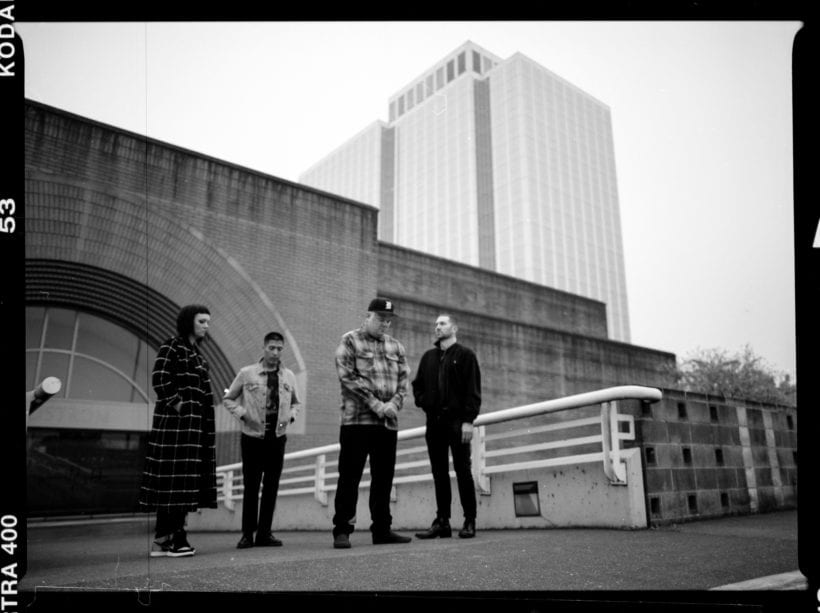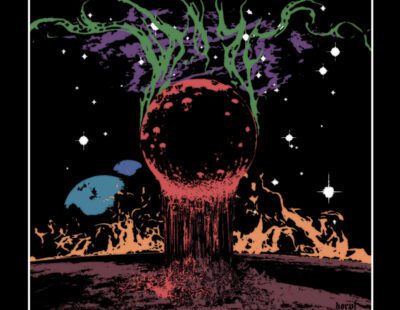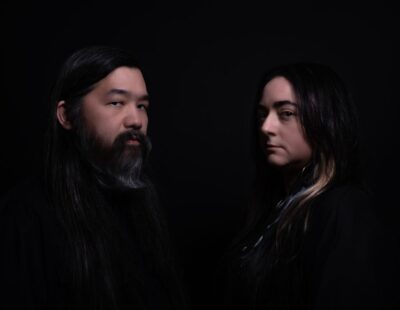
Portland-based post-punk champs Soft Kill have been an upward swing for the better part of their career, but it hasn’t always looked that way. Despite personal struggles with substance abuse, lineup changes (mostly in the drum capacity), and a near-catastrophic family crisis, the Tobias Grave-fronted powerhouse have persevered. No more so in COVID-19 times than any before it, but for sure the virus’ double-edged sword has impacted Soft Kill profoundly. On one hand, Soft Kill’s normally active touring schedule has been ground to a halt, with venues closing worldwide in an effort to stem the spread. On the other, the quarantine and subsequent isolation from others has refocused Grave (particularly) and team, musically and personally, where it was probably needed the most.
This magnifying glass is no more evident than on Soft Kill’s new album, Dead Kids, RIP City, a tongue-in-cheek play on (or through) a Kendrick Lamar album title and Portland’s professional basketball team, the Trail Blazers. See, Grave has ushered in (over the intervening years) a band with a diverse set of outer influences and likes. The singer/guitar player/songwriter finds comfort from and enjoyment in hip-hop as well as the murky depths of death metal. Not that you’d hear staccato call/response verses or lyrics about abominations of desolation in Soft Kill’s storied oeuvre, but the knowledge and appreciation are present. Indeed, Dead Kids, RIP City is a vibrant riot of bopping, shimmering indie rock (with roots in Asylum Party, The Chameleons, et al.), muted dream-state psychedelia, and singer-songwriter vulnerability. While folks have their favorites in Heresy, Choke, and Savior (others go farther back), Dead Kids, RIP City represents a fuller, more robust, hookier Soft Kill. Much of that is music growth. The David Trumfio (My Morning Jacket, Built to Spill) production and Howie Weinberg (The Cure, Smashing Pumpkins, Nirvana) mastering job have also, in effect, elevated the overall sonic aesthetic. Dare to say it, but after nine years and a multitude of releases, this is definitively Soft Kill.
Join Decibel as we find Tobias Grave extraordinarily ready to talk on a Sunday afternoon. Dead Kids, RIP City is out November 20th on Cercle Social Records.
Savior was very personal to you. How did you make the leap emotionally and conceptually to new album, Dead Kids, RIP City?
Tobias Grave: Savior was such a personal snapshot of our experience in the hospital with Dominick, my son. It definitely felt like—even with contributions from the other members that came after the initial songs had been written—a solo album. In a weird way it was. It felt self-absorbed is the best way to put it. With Dead Kids, we put a lot of effort into the collaborative efforts of the band. When we were around one another. That became difficult for a while, actually. We were really strewn about. I ended up moving back to Portland, Conrad [Vollmer] was still in Los Angeles (but then moved back to Portland), and on and on. Lyrically, Nicole [Francis], who is the behind-the-scenes, as somebody called it, “de facto internal management,” stepped up quite a bit. She helped define the Portland scene for Dead Kids. The one thing that we related on was our experiences in Portland. She grew up about an hour and a half south. When I came out here many years ago, I was in pretty rough shape. We ran the streets pretty hard together, battled addiction, and met a whole cast of really interesting characters, some of whom were really great artists, musicians, personalities. They were also stuck in the same trenches. The first song I wrote, “Pretty Face,” was about someone we knew, a friend named Zachary Delong. I wrote that song the day he passed away. We started to realize that there are a lot of stories about a lot of people that don’t get told. There’s a lot of beauty in the suffering. There’s a lot of lessons to be learned universally by people but more so by ourselves. I know we try not to think about those things—the people that have died—too much because of the hurt that it might cause, so we decided to make a whole record about that landscape of Portland that we—myself and Nicole—are no longer part of.
I understand the title, Dead Kids, RIP City, is a Portland-centric phrase. Or, at least part of it is.
Tobias Grave: RIP City is, yes. It’s a slang term for Portland that was connected to the [Trail] Blazers. How it was explained to me was a ‘rip’ was a swish in basketball. But I had stolen, or reworked rather, the title from Kendrick Lamar, who had an album titled Good Kid, M.A.A.D City. I thought, “Alright, what about Dead Kids, RIP City?” [Laughs] R.I.P. city also refers to the amount of kids who have died from addiction. It’s so fitting, but it also felt removed from what we were doing with titles before. Heresy, Choke, and Savior. One-word titles. We really wanted to have everything about this record be removed aesthetically.
I like that the title, Dead Kids, RIP City, is multi-faceted.
Tobias Grave: The Blazers, well, Nicole…
Tobias Grave: You laughing about the Blazers tells me all I need to know about you. [Laughs]
I spent half my life in Pistons land and the other half in 76ers land, so… we’re not far apart.
Tobias Grave: [Laughs] Dude, I know… But hear me out. And, well, this is so unimportant. I’m originally from Boston. North of Boston. By law, I’m a Celtics fan. I am the least invested in sports out of the Portland core of the band, which is Conrad, Nicole, and myself. We also have Danny [Deleon], but he lives in Long Beach. We welcomed a new member Ryan [Nichols] who lives down there too. So, Nicole grew up in Eugene, and is a diehard Blazers fan. Conrad is too. Well, he’s from Ohio, so he’s more of a players guy. The Blazers are such an underdog team though. The little-engine-that-could kind of team. They never quite make it over the hill. The city has accepted this standard. It’s like, “If we can make it to the conference finals, then that’s kind of like winning the Championship.” That’s reflective of how the city is as a music scene. Despite all the great bands that are (or were) from Portland, we’ve always been overlooked. We’d get tours that would hit Seattle, take a day off, then go to San Francisco. Portland was almost always overlooked. Maybe that’s changed a bit today. That stigma isn’t as great. There’s a self-deprecating quality to Portland. The Blazers, by and large, represent that.
By a thin red line, so too does Soft Kill.
Tobias Grave: We’re the Blazers of the independent rock scene. [Laughs]
What precipitated the collaborative effort this time around?
Tobias Grave: Well, when I say that Savior was a solo record—and I wrote the bulk of the songs when we were still in the hospital—I think I mean that because the subject matter was singularly being dictated by me. It can feel weird, as the front person of a band, to be speaking for the membership, especially when we’re talking about things that are so raw and hard to understand for some people. For Dead Kids, I still did a lot of the songwriting, but the studio process was different. Conrad and Danny helped shape things that became uniquely ours instead of simply re-creating the demos. So, the record was definitely collaborative. Everybody got their parts in there. Danny’s drumming makes the record on so many levels. There’s fills that he does—like during the transitions—that get me every single time. So, for this record, it felt like no matter who wrote, everyone was giving the songs their own spin. The nuance of how the guitars are played, the amps they use, and all the little things players do did make this record a lot more us than me, which is great, I think.
You collaborated with a few outsiders, too. I know you’re big fans of Adam Klopp (Choir Boy), but I’m unfamiliar with Tamaryn.
Tobias Grave: Right, Adam and Tamaryn are on the record. But, we also had minimal musical contribution from our producer David Trumfio. He did some synth and drum machine stuff. He gave it a new wave edge. I’m very Cro-Magnon in my approach. I don’t think about percussive changes from part to part. Things of that nature. I’ll press play on one drum machine pattern, and play over the whole thing.
Tobias Grave: Yeah, and I love that. I love their minimalism, the stuff they pulled from Krautrock. I’ve said this a million times, but I’ve always liked when it’s just the guitar or the drums that change minimally from verse to chorus. So, back to your previous question, yes, we had guests, and yes, they were Adam and Tamaryn. Adam did backing vocals on “Matty Rue” and Tamaryn, who has a lengthy and incredible discography, did a duet on “Floodgate.” I love guest spots. I mean, I listen to a lot of rap, so I’m used to there being guests on verses. Anytime, somebody can add their own take just makes it more interesting. We’ve always welcomed that. I will say, Dead Kids was our last album with Owen Glendower. He played bass on half of the record. He needed a break from touring to focus on other things. We’ve gone so hard as a band. COVID hitting put everyone at the crossroads of what they really wanted to do. For us, I really wanted to go out again, but I think, for us, it was nice to finally take a break. Definitely counterproductive to promoting a record, but I get to be home with my son, I get to have a normal sleep cycle…
The touring lifecycle is abnormal. Everything about it.
Tobias Grave: It is. And it’s scary how the touring lifecycle is similar to the addict’s lifecycle. Constant moving around, going place to place, always looking for the next thing. For me, it’s been hard to stay in place. Hard for everybody, I think. I will say I’ve had personal growth from all this COVID stuff.
You’ve come a long way. You’ve righted, for better or worse, your own ship.
Tobias Grave: The best thing that happened to me was that the drugs I wanted to do and the drugs I had done for so many years were the ones people didn’t want to share with you on tour. That being said, I was definitely susceptible to all the beers that were getting popped open, the joints that were getting fired up and passed around… People coming out of bathrooms with sniffily noses and stuff. I’m like a drug dog, but I’m not working for the cops, I’m working for myself. I want to get high. At the same time, I think being home for the past year really reinforced my relationship I have with my kid. My kid is a wall between me and bad decisions. Climbing over that wall in any direction means that I’m going to lose him, and I definitely don’t want to lose Dominick. I did care about that before, but I was gone so much, so I probably took that for granted to some degree.
You’re in a better place now. You’re eating better and going to the gym. I think this is something you can hear on Dead Kids. Nuances of it, anyway.
Tobias Grave: Yeah. This is the first record, admittedly, that I wrote clean. Savior was written clean, but I was also going on tours, getting fucked up and fucking up. I’ve been pretty transparent about that. For the longest time, I had a hang-up that—by rule of Spacemen 3—drugs were what led to or resulted in creating great music. [Laughs] Drugs made music interesting. I had a lot of fear and apprehension going into this record. I mean, I’ve made like 90 songs decked out of my mind. At least I could try one album clean. There’s clarity present throughout the record. The songwriting has evolved quite a bit. There’s a confidence that I hadn’t seen before. The lack of that confidence has made the last records special. They’re autobiographical in a sense. More so than that, getting to the gym—Nicole said I wasn’t allowed to talk about that, but… here we are—and taking better care of myself, grabbing those reins, was a big deal. I went from addiction to being incredibly overweight. My mental health, stereotypically, was intertwined with my physical health. So, taking the right steps was an immediate boost to my state of mind and my physical health. I could see real, crazy results. That will play into touring as well—how I want to live in a van, when the only thing I eat is $4.50 from a gas station at 1 in the morning.
Tobias Grave: Yes! I feel that too. At this point, Conrad’s been in the band for six years. Danny’s been in the band for over two. These are the best possible people to be making music with, to me. It has completely shaped how we consider who will come into the band and the role they’ll take in the future. We all know our temperaments, our ability to cope with each other on tour, and that has set a standard. Not only personally but musically as well. Dead Kids is a band record. Savior was handed over. The three of us shared the goal of Dead Kids together. That was exciting and inspiring. We also spent 13-14 days in the studio, which we’ve never done. We worked with a producer who was outside the norm. We wanted somebody who had a track record of creating big, good sounding indie rock records. David was that. We poured so much time into the studio sessions. We left each session exhausted. It had to be perfect. I found myself—and I’m not alone in this—thinking about all things that drove me crazy about the productions of past records. Whether it’s simple stupid things (like putting on new bass strings right before recording Choke) or great big things like fucking up, I wanted Dead Kids to be everything we’ve ever wanted in a Soft Kill record.
I get that. It’s a proper record. It sounds like a major label record from the ‘90s. Not to sound demeaning to past records, but Dead Kids has a presence, an import.
Tobias Grave: That’s intentional. Things are different now for labels, but mentally paying attention to the way the bands we grew up listening to—how they played and how they progressed—matured. OK, look at this way, I know people love An Open Door, but it’s the same guitar on every fucking song. It’s the same approach. There’s aspects of An Open Door that make it as good as it’s ever going to get. And that’s fine. I love that record. Even on Choke, when we started to experiment a little musically, the production was entirely one dimensional. Savior was supposed to be oppressive, a wall of emotions. I go back and forth with Savior though. It’s such an open wound, even though my son’s doing great. Dead Kids is, “God, look at Asylum Party, The Chameleons, Psychedelic Furs… the era is the genre, not the other way around.” We wanted to make a record that was like a soundtrack. We always talk about Breakfast Club…
Dead Kids is the unreleased soundtrack, right? I would like to think John Hughes would’ve dug the vibe on Dead Kids from a full-length, theatrical standpoint.
Tobias Grave: Yeah, I think so too, but I know people will think that’s corny. Dead Kids has so much variation to it. It has plenty of what people have come to expect from us, plus it has plenty that will surprise them. Production-wise, the vocals are right on top, the drums are “nuggety,” which is a Trumfio term, and pounding and clear, the bass is pronounced for once, and the guitars we put so much effort into picking the right guitar and the right setup for every single riff that there’s tonal variation. Dead Kids doesn’t get redundant.
But it’s a modern-sounding record, too. There’s roots in nostalgia, but it’s not bound entirely to it. That’s maturity, sir.
Tobias Grave: [Laughs] We’re trying to establish ourselves. We have many faces of what we’re capable of. We’re going to do whatever the fuck we want. We’re not a nostalgia band. We’re also not a band writing to keywords. “For fans of…”-type thing. For me, I wanted the world to accept what Soft Kill is. Post-punk is a multi-dimensional genre. It’s not just The Cure and Joy Division. I mean, the groundhog day thing can be fun but also tiresome. I’m a fan of death metal, so I hear that the caveman thing is happening again, but soon enough it’ll be tech death metal that’s hip, right? It’s fine and great, ‘cause, as a rule, I like stupid metal more than smart metal. [Laughs] But I see these things happening with us too. Post-punk is at its most celebrated and replicated now. It’s no longer this cult thing. There’s a comfort zone happening. I mean, rap and metal have been around for so long and have such an entrenched culture, that things are bound to repeat more so than they are to drive forward. Post-punk is exactly like that too. So, back to your question again, I think the record is familiar, but we’re trying to distance ourselves from the obvious.
** Soft Kill’s new album, Dead Kids, R.I.P. City, is out November 20th, 2020 on Cercle Social Records. The album is available on LP, CD, and cassette. Pre-order HERE before it’s fucking too late!
** Decibel and Soft Kill go way back. Check out interviews (HERE, HERE) and audio premieres (HERE, HERE). Tell Tobias Decibel sent you!






